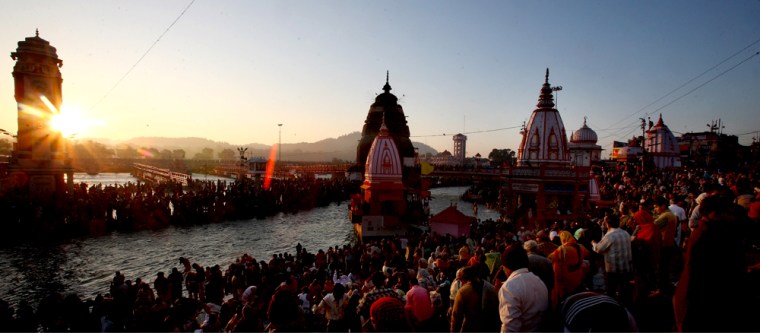Hundreds of thousands of devotees bathed in the icy waters of the Ganges river Thursday as a monthslong Hindu festival expected to attract more than 10 million people kicked off in one of northern India's holiest cities.
The start of the festival was marred by tragedy elsewhere in the country when pilgrims jostling to get to a river temple stampeded, crushing six elderly women and a child and injuring another 12 pilgrims, police said.
The stampede occurred at a river jetty as thousands of pilgrims tried to board boats to the island temple nearly 60 miles south of Calcutta, the capital of West Bengal state, said Surajit Kar Purakayastha, an inspector-general of police.
Stampedes are common during religious festivities in India and platoons of policemen were on alert at the main festival in the northern Indian city of Haridwar. Authorities made constant announcements asking people to move in orderly lines to the specially marked bathing areas along the river banks.
There, hundreds of thousands of men, women and children entered the fast-moving waters of the river in a holy ritual that is part of the Kumbh Mela, touted as the largest religious gathering in the world. The festival, which is celebrated every three years, rotates among four Indian cities.
Braving rain and cold weather with night temperatures dipping below 45 degrees Fahrenheit, devotees from all over India in cars, buses, trains and tractor-driven carriages have been pouring into Haridwar, a temple-filled town at the foothills of the Himalayas where the Ganges river enters the sprawling plains of northern India.
Shyam Lal, 55, arrived from New Delhi to participate in the festival — his fifth since the early 1980s. "It is Hindus' belief that bathing in the Ganges river on the occasion purifies one's soul. It also helps in controlling one's desires in a materialistic world," he said.
The plunges in cold water began before sunrise Thursday, Anand Vardhan, a top state government official, told The Associated Press.
'Worth the discomfort'
Thousands of police — equipped with closed-circuit television and metal detectors — were on alert not only for stampedes, but also terrorist attacks and crime among the pilgrims, who will crowd into tents or sleep outside during the more than 100-day festival.
Hundreds of green, blue and brown tents have been spread out over a vast 80-square-mile area where more than 15,000 makeshift toilets have been erected and 10,000 people employed to keep the tent city clean, Chandra Shekhar Bhatt, one the festival organizers told The Associated Press.
"The pilgrims have been advised to carry identity cards" due to terrorist threats, said regional police official Alok Sharma, adding that closed circuit television will monitor the entire festival area.
The festival has no history of terrorists attacks, but police are taking precautions
Dheerajbhai Phuladia, a farmer from distant western Gujarat state, shivered as he emerged from the river. "It wasn't as cold as I had feared," he said as he pulled on woolen clothes. "The cold is nothing if you have faith. This experience is worth the discomfort."
About 3 million people will bathe in the river Thursday, the first of 10 auspicious days over the next three months when devout Hindus believe a dip will cleanse them of their sins and free them from the cycle of life and rebirth.
The Kumbh Mela, or Pitcher Festival, derives its name from a mythical fight over a pitcher of holy nectar.
According to Hindu mythology, gods and demons waged a war over the nectar they needed to achieve immortality and victory. Four drops spilled, landing in the four cities that host the festival: Allahabad, the confluence of the Ganges, Yamuna and the mythic Saraswati rivers; Nasik, in the western state of Maharashtra; Ujjain, in central India; and in Haridwar.
